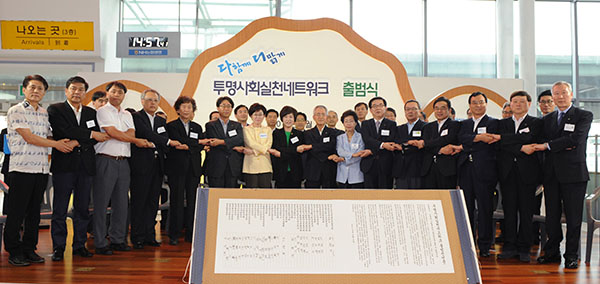News & Publications
Press Release
Korea launches a new public-private network to fight corruption
- Date2015-01-08
- Hit1,476

September 3, 2014
The Korean Network on Anti-Corruption and Transparency (K-NACT) officially held its inauguration ceremony on September 3rd at Seoul Station and began its journey to promote a culture of integrity across the country. The K-NACT consists of 38 government, civic and vocational organizations that joined together to eradicate corruption and promote integrity since its predecessor, the Council for the Korean Pact on Anti-Corruption and Transparency (K-PACT), was wound up in 2008.
At the inauguration ceremony, the heads of the participating groups elected the board members of the K-NACT and signed a joint declaration. Lee Sungbo, the Chairman of the ACRC was elected as a public division head. Cha Kyung-ai, the President of National YWCA of Korea, and Chae Young-su, the standing representative of the Transparent Society Movement Center under Hung Sa Dan, were elected as community division co-heads. Hwang Young-sik, the co-representative of Busan Network on Anti-Corruption and Transparency, was elected as a regional division head.
The inaugural declaration of the K-NACT stated, "A society cannot open a bright future, nor broaden its horizon if it fails to root out corruption. We should eradicate all sorts of corruption and malpractice to hand over a transparent society to our descendants."
After the inauguration ceremony, the members of the K-NACT conducted a public anti-corruption campaign near Seoul Station.
With its slogan "Make the World More Transparent Together," the K-NACT is going to work on a variety of national initiatives to enhance the transparency of public agencies and society as a whole. Its main initiatives include visits to agencies with good practices and exchange programs, fostering instructors specializing in anti-corruption, and publication of newsletters.
The network also plans to come up with new systems through various activities, such as joint research and symposiums, in order to make policy recommendations to the government and help member agencies to follow best practices.









